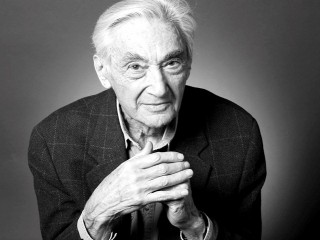
Howard Zinn biography
Date of birth : 1922-08-24
Date of death : 2010-01-27
Birthplace : New York City, New York, US
Nationality : American
Category : Famous Figures
Last modified : 2011-06-20
Credited as : Academic and author, historian, The New Abolitionists
Howard Zinn was born on August 24, 1922, in New York City. During World War II, he served from 1943 to 1945 as a second lieutenant in the United States Army Air Force and participated in bombing missions in Europe. He was awarded an Air Medal and several battle stars. After his discharge from the service he attended New York University and received his bachelor's degree in 1951. He did graduate work in political science at Columbia University, completing his masters degree in 1952 and his Ph.D. in 1958. During this time he was an instructor at Upsala College in East Orange, NJ, from 1953 to 1956.
Zinn's doctoral dissertation on New York Mayor Fiorello LaGuardia's congressional career was published in 1959 as LaGuardia in Congress. Zinn portrayed LaGuardia as a feisty liberal Republican who fought for pro-labor legislation and criticized the upper-class bias of his party's economic policies. Although LaGuardia would remain one of his heroes, Zinn's own political views grew much more radical. In Zinn's introduction to his anthology New Deal Thought (1965), he argued that President Franklin D. Roosevelt and his leading advisers thwarted a possible American social revolution by pursuing the modest goal of restoring the American middle class to prosperity and rejecting more radical social reform.
Events in the late 1950s and early 1960s reinforced Zinn's disillusionment with American liberalism. In 1956 he moved to Atlanta, GA, to accept a post as chairman of the department of history and social science at Spelman College, an African-American women's school. During the seven years he taught there, Zinn saw and participated in some of the key events of the civil rights movement. He was shocked by the violence directed at African-Americans and dismayed by the federal government's failure to defend their rights more vigorously. Zinn was critical of President John Kennedy's administration. Though it was regarded as liberal by many Americans, it seemed to Zinn to be weak in response to demands for equality.
Zinn's study of one of the major civil rights organizations, the Student Nonviolent Coordinating Committee, was published as SNCC: The New Abolitionists (1964). The book was both an impassioned first-hand description of the civil rights struggle and a cogent historical analysis of the modern movement's links with pre-Civil War abolitionism.
Zinn joined Boston University's Government Department in 1964 and remained a professor of political science there the rest of his career. He became well known in New Left circles for his opposition to United States military involvement in Vietnam. In his book Vietnam: The Logic of Withdrawal (1967), he made a powerful case for reversing the Lyndon Johnson administration's policy of escalation. Zinn's role in the peace movement was not limited to his scholarly writings. Throughout the mid-1960s he was active in the American Mobilization Committee's national drive to bring an end to the United States intervention. In February 1968, he travelled to North Vietnam with the radical priest, Father Daniel Berrigan, to secure the release of three American bomber pilots shot down on air raids. As he had done earlier with his experiences in the civil rights movement, Zinn wrote articles that offered a first-hand account of his trip to Hanoi.
Traditional academics scolded Zinn for being partisan about his subject matter. In a collection of his essays, The Politics of History (1970), Zinn rejected the view that historical scholarship was objective. He argued that all historical writing was political and that historians should align themselves with humane values. To fail to speak out against evil, he warned, was to be irrelevant and irresponsible. Zinn sought to illustrate the usefulness of a politically engaged approach to history in his essays on World War II, the civil rights movement, and the Vietnam War. They provided examples of how his historical approach worked in practice.
When critics charged that the New Left historians' work was deficient because radical scholars had not produced a full-scale synthesis of American history, Zinn set to work to prove them wrong. Zinn's A People's History of the United States (1980), surveyed all of American history from the point of view of the working classes and minority groups. He documented the history of race, sex, and class; the history of civil disobedience; how hopes for a more egalitarian society had been frustrated, and how a small, upper-class elite had retained its hold on power and wealth. "Zinn admits his bias candidly," noted reviewer Luther Spoehr in Saturday Review "insisting that 'we need some counter force to avoid being crushed into submission."' Eric Foner, in the New York Times Book Review, said the book could be considered "a step toward a coherent new version of American history." In 1984, the book was abridged and updated and republished as The Twentieth Century: A People's History.
Zinn remained active in leftist politics and contributed to scholarly journals and popular publications, including Harper's, Saturday Review and The Nation. With his wife Roslyn, he had two children. He became a professor emeritus at Boston University in 1988. In 1985, he published a play, Daughter of Venus, which was first performed at New York's Theatre for New City. In 1990, his book Declarations of Independence continued his populist approach to American history.
















